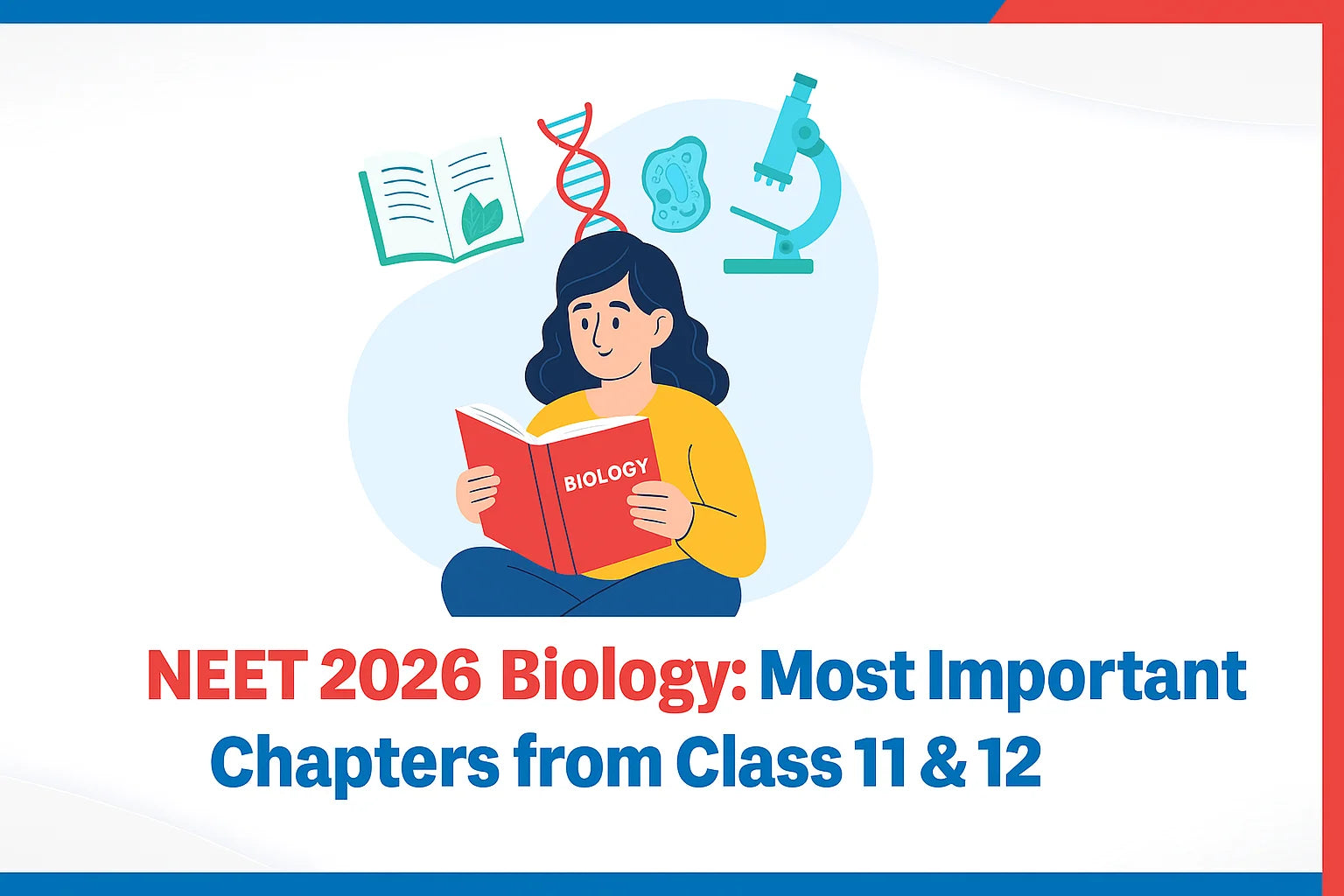To be ready to take NEET 2026, it is necessary not only to work hard but also to manage time. Lakhs of students compete to get a seat in medical colleges each year and one of the most important aspects that sets the successful candidate apart from the rest is the way he/she manage his/her time in studying. Time allocation subject-wise is very crucial in maximizing efficiency and ensuring that every subject, Physics, Chemistry, and Biology, is accorded the appropriate time.
There are students who waste their time studying without a direction. This usually causes burnout, low retention, and lack of balance in subject preparation. In order to beat this, you require a methodical study schedule based on the NEET syllabus, exam pattern, and subject weightage. In addition to the scheduled time, practice by using tools such as a NEET question bank, a NEET preparation question bank, and a NEET mock test book, which will aid in practicing regularly and in being exam-ready.
Why is Subject-Wise Time Allocation Important for NEET 2026?
The most frequent error made by NEET aspirants is that they focus too much on one subject and do not focus on others. As an example, there are those students who are scared of Physics and spend weeks just solving numerical problems, and others are engulfed in Biology and neglect Chemistry. The outcome is half-baked preparation, which has a direct effect on the final score.
Subject-wise time allocation ensures:
-
Balanced coverage of all subjects.
-
Adequate practice time for weak areas.
-
Proper revision of high-weightage topics.
-
Increased efficiency by aligning study hours with learning ability.
Let’s understand how time should be distributed among Biology, Physics, and Chemistry for NEET 2026.
Ideal Subject-Wise Time Distribution
The NEET exam consists of 200 questions, out of which 180 must be attempted. The subject-wise question distribution is as follows:
|
Subject |
Total Questions |
Marks |
Weightage (%) |
|
Biology |
90 |
360 |
50% |
|
Chemistry |
45 |
180 |
25% |
|
Physics |
45 |
180 |
25% |
From the above table, it is clear that Biology holds the maximum weightage and therefore requires more study time. However, Physics and Chemistry cannot be ignored, as each contributes equally to the remaining 50% of marks.
Read More: Most Difficult Physics Topics in NEET & How to Master Them
Suggested Daily Time Allocation
A disciplined daily timetable is the key to NEET success. Below is an example of how you can allocate your study time:
|
Subject |
Daily Study Hours |
Focus Area |
|
Biology |
5–6 hours |
NCERT-based concepts, diagrams, past year questions |
|
Chemistry |
3–4 hours |
Organic reactions, Physical Chemistry numericals, Inorganic fundamentals |
|
Physics |
4–5 hours |
Mechanics, Electrodynamics, Modern Physics, problem-solving practice |
This adds up to about 12–15 hours of dedicated study time daily for full-time aspirants. For school-going students, the hours can be adjusted proportionally, with Biology always receiving the maximum time share.
How Much Time Should Be Given to Biology for NEET 2026?
The NEET exam is based on biology. It occupies 50 percent of the paper and, therefore, it is not negotiable to give it maximum time. Ideally, 5-6 hours per day are to be dedicated to Biology. Concentrate on NCERT books, since the majority of questions are directly framed out of them. Simultaneously, NEET question bank practice will make sure that you are exposed to the past years' trends, which are vital in scoring good marks.
Can I crack NEET if I only focus on Biology?
Although Biology has 360 marks, it is dangerous to depend on it. Another 360 marks is in Physics and Chemistry together. You can get full in Biology but fail to get a government seat because you did not perform well in the other two subjects. Time should thus be allocated in a balanced manner.
How Much Time Should Be Given to Physics for NEET 2026?
Physics is usually the most difficult subject among the aspirants because of its conceptual and numerical nature. Physics should be ideally 4-5 hours per day. Begin with NCERT basics, then go to conceptual clarity and problem-solving. This time was to be split into the learning of the theory (40%) and the practice questions (60%).
How many questions in Physics are calculation-based?
Practically 70 percent of the Physics questions in NEET are based on calculations and they test speed and accuracy. Solving NEET preparation question banks is useful because it will resemble the real exam situation and enhance the ability to solve numerical problems.
How Much Time Should Be Given to Chemistry for NEET 2026?
Chemistry is a scoring subject if approached strategically. Daily 3–4 hours should be allotted to Chemistry. Physical Chemistry requires problem-solving, Organic Chemistry demands reaction mechanism practice, while Inorganic Chemistry is memory-based. A balance between these three is essential.
Which part of Chemistry is the most scoring in NEET?
Inorganic Chemistry, especially NCERT-based chapters like Coordination Compounds and Periodic Table, often provides direct questions. Regular practice and memorization make this part easier to score.
Weekly Subject-Wise Allocation
Apart from daily allocation, a weekly schedule helps maintain consistency.
|
Subject |
Weekly Hours |
Strategy |
|
Biology |
35–40 hours |
Revise NCERT, diagrams, practice mock questions |
|
Chemistry |
20–25 hours |
Balance theory and numerical problem-solving |
|
Physics |
25–30 hours |
Focus on high-weightage topics and problem-solving |
This ensures balanced coverage and prevents subject neglect.
Balancing Theory, Practice, and Revision
A lot of aspirants waste their time just reading theory without solving questions. The correct strategy towards NEET 2026 is:
• 40% time on Theory: NCERT concepts, diagrams and formulae.
• 40 % on Practice: Solving MCQs, practicing using a NEET mock test book, and doing time-based questions.
• 20% on Revision: Repeating the weak areas to build up the retention.
This division of time will make sure that not only knowledge is acquired but also properly applied in exam circumstances.
What is the amount of time to study NEET 2026?
The aspirants of NEET 2026 can devote an average of 10-12 hours of concentrated study daily. But the thing is quantity is not that important. It is not only sitting with books but active learning, solving problems, and mock tests.
Should I study all three subjects daily or focus on one at a time?
All three subjects should be studied on a daily basis. Studying a single subject in several days will result in imbalance and forgetting what has been learned. The daily time allocation to Biology, Physics and Chemistry ensures continuity.
How do I manage revision with ongoing preparation?
It is most effective on a weekly revision cycle. Take at least a day a week to do full length revision of concepts learnt in that week. This avoids last minute overloading and assists in retention of long term memory.
When should I start solving NEET mock tests?
Mock tests should ideally begin once you complete at least 70% of the syllabus. However, chapter-wise tests from a NEET preparation question bank can be started right from the beginning. This improves accuracy, builds confidence, and helps identify weak areas.
Common Mistakes in Subject-Wise Time Allocation
Students often make errors like:
-
Spending disproportionate time on Biology while neglecting Physics.
-
Not revising Chemistry regularly, leading to forgetfulness.
-
Reading theory without practicing questions.
-
Ignoring mock test practice until the last month.
Avoiding these mistakes ensures better subject balance and preparation efficiency.
How to Adjust Time Allocation During Final Months
As NEET 2026 approaches, your time allocation strategy must evolve. During the last 3 months, focus shifts from learning new concepts to revising and practicing extensively. Allocate 50% of your study time to Biology, 25% to Physics, and 25% to Chemistry. Alongside, solve full-length tests from a NEET mock test book under timed conditions.
Practice comprehensively with Oswaal360 online courses for the NEET exam
Practice Now with Free Oswaal360 Online Mock Test for NEET Exam
Final Thoughts
Subject-wise time allocation is not a rigid formula but a flexible strategy that can be customized based on your strengths and weaknesses. While Biology requires maximum attention due to its weightage, Physics and Chemistry should never be sidelined. A well-planned study timetable, consistent practice using a NEET question bank, and timed practice with a NEET mock test book are essential ingredients for success.
If you approach your NEET 2026 preparation with discipline, balance, and consistent practice, you can maximize your score and secure a seat in your dream medical college














